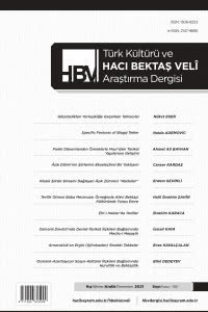Hintli yazar qurratulain hyder’ın “Hacı Gül Baba Bektaşi’nin öğütleri” adlı kısa hikayesinde doğu-batı karşıtlığı ve Hyder’in bütünlük arayışı
The clash of east and west and the search for unity in qurratulain Hyder’s short story, “sermons of Haci Gul Baba Bektashi”
___
ARPA, A. ve ERTAŞ, K. (2012). “ Batini Düşüncede Tevil ve Nusayrilik.” Türk Kültürü ve Haci Bektaş Veli Araştirma Dergisi, 62: 289-304.ÇİFT, S. (2009). “Bektaşi Geleneğinde Vahdet-i Vücud ve İbnü’l-Arabi.” Tasavvuf: İlmive Akademik Araştirma Dergisi, (İbnü’l-Arabi Özel Sayisi-2), 23:257-279.
DERİN, S.(2009). “The Self and the Other in İbn Arabi and Rumi.” Tasavvuf: İlmi ve Akademik Araştirma Dergisi, (İbnü’l-Arabi Özel Sayisi-2), 23: 109-130.
DHARWADKER, V. (2001).“Fiction at Play: The Truth about Haji Gul Baba Bektashi.” The Annual of Urdu Studies, 16: 98-108.
DOJA, A. (2006). “A Political History of Bektashism from Ottoman Anatolia to Contemporary Turkey.” Journal of Church and State, Vol. 48 (2), 423-450.
FOUTS, A. M.(2004). “Satori: Toward a Conceptual Analysis.” Budhist-Christian Studies, 24: 101-116.
HASAN, K.(2008).“Qurratulain Hyder: Literature’s First Lady.” The Annual of Urdu Studies, Vol. 23: 206-212.
HUSSEİN, A. (2011). “Mother Tongue, Father Tongue.” Journal of Postcolonial Writing, 47 (2): 199-204
HYDER, Q. (2004). “The Sermons of Haji Gul Baba Bektashi.” Short Stories by Contemporary İndian Women: Separate Journeys. Geeta Dharmarajan (Ed.) US: University of South Carolina Press, 92-99.
KASULİS, T. P. (1990). “ İntimacy: A General Orientation in Japanese Religious Values.” Philosophy East and West, 4 (4) (October):433-449.
LAMARQUE, P. (1989). “Expression and the Mask: The Dissolution of Personality in Noh.” The Journal of Aesthetics and Art Criticism, 47 (2), (Spring): 157-167.
MACDONALD-D’COSTA, A. (2009). “İndia’s Uncanny: Anglo-İndians as Gothic.” Continuum: Journal of Media and Cultural Studies, 23, (3), (June): 335-349.
MENO, R. (2008). “Endearing İconoclast.” The Annual of Urdu Studies, 23: 202-205.
RAO, S. N. (1999). “ Book Review” World Literature Today, 73 (Summer): 597.
PARK, J. Y. (2005). “Zen Language in our Time: The Case of Pojo Chinul’s Hoatuo Meditation.” Philosophy East and West, 55, (1), (January): 80-98.
PRAMUK, C. (2008). “Something Breaks Through a Little”: The Marriage of Zen and Sophia in the Life of Thomas Merton.”, Buddhist-Christian Studies, 28: 67-89.
RUMİ, R. (2007). “ Writer’s Muse: Conversation with Renowed Author Qurratulain Hyder.” http://razarumi.blogspot.com/. Erişim tarihi: 25 Temmuz 2011
SPYRA, A. (2006). “İs Cosmopolitanism Not for Women? Migration in Qurratulain Hyder’s Sita Betrayed and Amita Ghosh’s The Shadow Lines.” Frontier, 27 (2):1-26.
STEELE, L. (2008). “We Just Stayed on the Ship to Bombay.”The Annual of Urdu Studies, 23: 182-195.
STEİNBECK, C. (2007). “Time is not Fleeing: Thoughts of a Medieval Zen Buddhist.” KronoScope, 7: 33-47.
ÜÇÜNCÜ, K. (2011). “Dinî-Tasavvufi Türk Edebiyati Vadisinde Batini Yorum Geleneği Üzerine Bazi Düşünceler. Türk Kültürü ve Haci Bektaş Veli Araştirma Dergisi, 59: 223-238.
YİLDİRİM, R. (2009). “Tasavvufi Bir Yorum Olarak Alevilik ve Bektaşilik.” Ekev Akademi Dergisi, 13 (41), (Güz) :103-114.
- ISSN: 1306-8253
- Yayın Aralığı: 4
- Başlangıç: 1994
- Yayıncı: Ankara Hacı Bayram Veli Üniversitesi Türk Kültürü Açısından Hacı Bektaş-ı Veli Araştırmaları Uygulama ve Araştırma Merkezi
Hatip zâkirî Hasan Efendi’nin nühüft makamındaki imam Hüseyin mersiyesi
Dede Şeyh Hasanlar ile aşiret Şeyh Şasanlar
Seyyit Turak’ın Hacı Bektaş’ın doğumu ve hayatı hakkındaki eseri
Sözlü tarih ve kültür açısından İmam Rıza Ocağı
Dediği sultan ve menakıbı: Konya ve çevresinde Alevi Bektaşi ocaklarının izleri
Şah İsmail Hatâyî’nin şiirlerinde kullandığı vezin meselesi
Şeyh-i Seb‘alık kurumu ve Osmanlı esnaf teşkilatı içindeki yeri
Hacı Bektaş Velî’ Mâkâlât’ında akıl-iman ilişkisinin din felsefesi açısından tahlili
Abdullah Salâhî’nin Hazreti Hasan ve Hüseyin’i övgüsü: Hilye-i Hasaneyn
